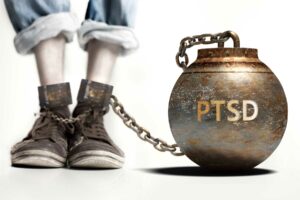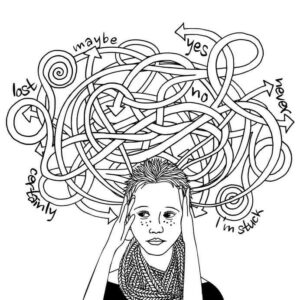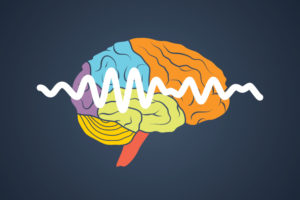If you think you or someone you know is experiencing post-traumatic stress disorder (PTSD), it’s important to be aware of the warning signs. PTSD can occur after any traumatic event, such as a car accident, natural disaster, assault, or exposure to combat. Symptoms can vary from person to person, but there are some common signs that may indicate PTSD is present. In this blog post, we will discuss the warning signs of PTSD and what you can do if you think you might be suffering from it.
Contents
Defining PTSD
 PTSD, a popular acronym for post-traumatic stress disorder, is a type of anxiety disorder that can develop after exposure to a traumatic event. When someone goes through a traumatic experience, it is not uncommon for them to feel scared, confused, or even helpless. These are all perfectly normal reactions to a traumatic event. However, for some people, these feelings do not go away and can get worse over time. This can lead to the development of PTSD.
PTSD, a popular acronym for post-traumatic stress disorder, is a type of anxiety disorder that can develop after exposure to a traumatic event. When someone goes through a traumatic experience, it is not uncommon for them to feel scared, confused, or even helpless. These are all perfectly normal reactions to a traumatic event. However, for some people, these feelings do not go away and can get worse over time. This can lead to the development of PTSD.
It is important to note that PTSD is not the same thing as experiencing normal grief or sadness after a traumatic event. With PTSD, the symptoms are much more severe and can have a major impact on your life. If you think you might be suffering from PTSD, it is important to seek professional help.
Signs Of PTSD
PTSD signs and symptoms are complex and can often be confused with other disorders such as depression or anxiety. It is important to be aware of the signs and symptoms so that you can get the help you need. Signs of PTSD are divided into 4 categories:
Intrusive thoughts
 In simple words, intrusive thoughts are unwanted, often distressing thoughts that seem to come out of nowhere. People with PTSD may have recurrent and intrusive memories of the traumatic event. They may also have nightmares or flashbacks where they feel like they are reliving the experience.
In simple words, intrusive thoughts are unwanted, often distressing thoughts that seem to come out of nowhere. People with PTSD may have recurrent and intrusive memories of the traumatic event. They may also have nightmares or flashbacks where they feel like they are reliving the experience.
Let us understand this better with the help of an example. Supposing that you were in a car accident. You may have intrusive thoughts about the accident, such as what could have happened if you had been driving faster or slower. These thoughts can be very distressing and can make it hard to concentrate on anything else.
Similarly, if someone was sexually assaulted, they may have intrusive thoughts about the assault. These thoughts can be so distressing that they may avoid anything that reminds them of the event, such as people or places.
Some of the most common signs to identify if you or someone else is experiencing intrusive thoughts is through the following:
- A feeling of being on edge, or hypervigilance
- Irritability or outbursts of anger
- Difficulty concentrating
- Sleep problems
- Re-experiencing the trauma through flashbacks or nightmares
These signs and symptoms can vary from person to person, and not everyone who experiences intrusive thoughts will develop PTSD.
Negative changes in thinking and mood
 When we experience something traumatic, it is only natural to feel afraid, confused, and alone. However, for some people, these feelings don’t go away and can even get worse over time. If you find yourself feeling more hopeless or helpless than before, it could be a sign that you are struggling to cope with your trauma.
When we experience something traumatic, it is only natural to feel afraid, confused, and alone. However, for some people, these feelings don’t go away and can even get worse over time. If you find yourself feeling more hopeless or helpless than before, it could be a sign that you are struggling to cope with your trauma.
For example, if you used to be a positive person but now you find yourself constantly feeling negative or even paranoid, it could be a sign that your trauma is affecting your mental health. If you are struggling to concentrate or complete simple tasks, it could be a sign that your PTSD is starting to interfere with your daily life. Other changes in thinking may include:
- Feeling like the world is a dangerous place
- Difficulty concentrating
- Hyperarousal
- Thinking people will only hurt you
- Losing interest in activities that used to make you happy
- Unable to recall positive memories from the past
- Always on guard, feeling like you need to protect yourself
- Detachment or numbing from others and your surroundings
- Feeling hopeless about the future
- Memory problems, including difficulty recalling details of the traumatic event(s)
These are just some of the more common changes in thinking that may be experienced after a traumatic event.
Avoidance

This may be a self-explanatory sign of PTSD. Avoidance simply means that you go out of your way to avoid anything that reminds you of your trauma. For example, if you were in a car accident, you may avoid driving or even getting in a car. Or, if you were assaulted, you may avoid being in crowds or going out at night.
For people with PTSD, arousal becomes the new normal. This means that your fight-or-flight response is constantly turned on, and as a result, you may avoid anything that reminds you of your trauma. This gradually becomes your brain’s way of protecting you from further harm. Avoidance symptoms in PTSD may manifest themselves in the following ways:
- Avoiding people, places, things, or situations that remind you of your trauma.
- Trying to numb your feelings by using alcohol or drugs, or by numbing yourself emotionally.
- Finding it hard to concentrate or sleep.
- Being irritable and having a hard time controlling your anger.
- Feeling easily startled or always on guard
- Sensing that you’re in danger, even when you’re not
- Physical symptoms like chest pain or headaches
These are all signs that your fight-or-flight response is constantly activated, and your brain is trying to protect you from further harm.
Changes in physical and emotional reactions
 It is no secret that our brain and body are interconnected. When our brain experiences trauma, it can cause physical changes in our body as well. For example, if you had a particularly traumatic experience with animals, you may start to feel physical symptoms like sweating or a racing heart when you see an animal.
It is no secret that our brain and body are interconnected. When our brain experiences trauma, it can cause physical changes in our body as well. For example, if you had a particularly traumatic experience with animals, you may start to feel physical symptoms like sweating or a racing heart when you see an animal.
Or, if you were in a car accident, you may find that you have a hard time driving or even getting in a car. This is because your brain has associated the car with the trauma and is trying to protect you from further harm.
Some of the common changes in physical and emotional reactions in PTSD include:
- Flashbacks
- Nightmares
- Intrusive thoughts
- Panic attacks
- Difficulty sleeping
- Exaggerated startle response
- Angry outbursts
- Irritability
- Hyper-vigilance
These changes may differ in intensity and frequency, but they are all signs that your brain is struggling to cope with the trauma.
Tips To Manage The Signs Of PTSD

Now that we are aware of some of the signs of PTSD, let’s explore some tips on how to manage them.
The very first step is to seek professional help. A therapist who specializes in trauma can help you understand and manage your symptoms. Typically, therapy is combined with medication to help manage the symptoms of PTSD. The most effective therapy approaches for treating PTSD are:
- Cognitive behavioral therapy
- Psychodynamic therapy
- Prolonged exposure therapy
- Eye movement desensitization and reprocessing (EMDR)
- Expressive art therapy
- Group therapy
These therapies can help you process and make sense of your trauma, which can be incredibly helpful in managing your symptoms.
Additionally, some of the most common medications used to treat PTSD include:
- Selective serotonin reuptake inhibitors (SSRIs)
- Serotonin-norepinephrine reuptake inhibitors (SNRIs)
- Antidepressants
- Antipsychotics
- Anti-anxiety medications
- Sleep aids
It is important to remember that medication has certain side effects that can be harmful. Be sure to speak to a professional before starting and also stopping any psychiatric medication.
There are also some things that you can do on your own to help manage your symptoms. Some self-care strategies that may be helpful include:
- Getting regular exercise
- Eating a healthy diet
- Getting enough sleep
- Practicing relaxation techniques like yoga or meditation
- Avoiding alcohol and drugs
- Forming a support system
- Finding a creative outlet for your feelings, such as writing, painting, or music
- Engaging in activities that make you feel good, such as spending time in nature or volunteering
These are just some of the things that you can do to help manage your symptoms. It is important to remember that everyone copes with trauma in their own way, so what works for one person may not work for another. Just try to be patient with yourself and give yourself time to heal. If you or someone you know is struggling with PTSD, don’t hesitate to reach out for help. There are many resources available to you, and you don’t have to go through this alone.
Conclusion
In conclusion, PTSD, or post-traumatic stress disorder, is a mental health condition that can develop after exposure to a traumatic event. If you or someone you know is struggling with PTSD, it is important to be aware of the signs and symptoms. With proper treatment, people with PTSD can learn to manage their symptoms and live healthy and fulfilling lives.
If you or someone you know is looking for psychological help, Therapy Mantra is here for you. We are the leading providers of online therapy and counseling. Our team of highly trained and experienced therapists can provide assistance at the most affordable rates. Contact us today to learn more about our services. You may also visit our website to book an online therapy session or download our free Android or iOS app for more information.


